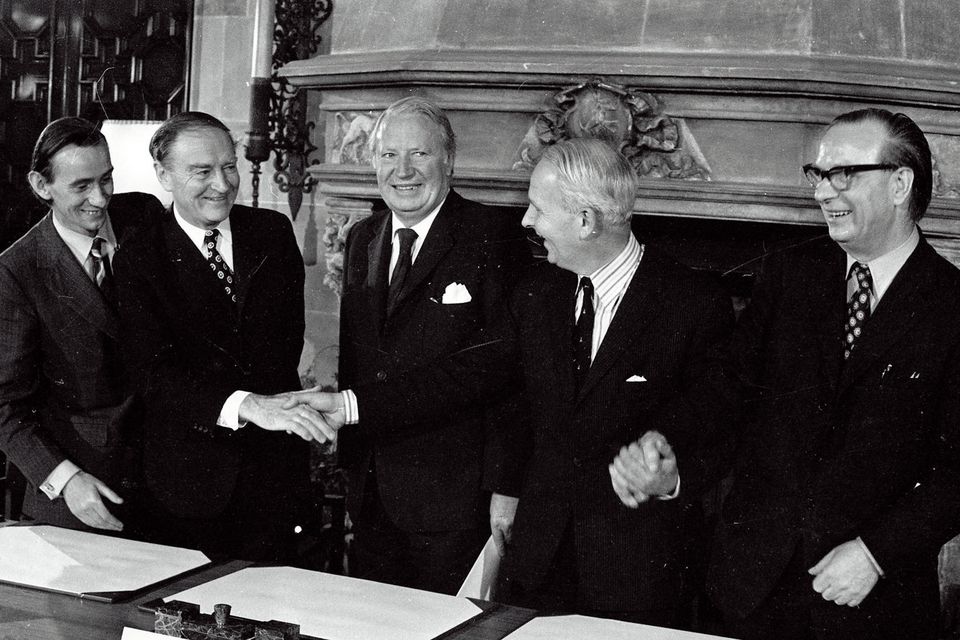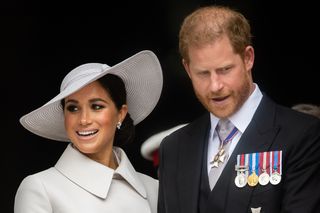John Downing: Fifty years on from Sunningdale, we still don’t have permanent peace in the North
From left to right, Oliver Napier, leader of the Alliance Party of Northern Ireland, Taoiseach Liam Cosgrave, British prime minister Edward Heath, Brian Faulkner, leader of the Ulster Unionist Party, and Gerry Fitt, Leader of the Social Democratic and Labour Party.
Over 20 years ago, in July 2001 to be precise, Bertie Ahern was on an official visit to Brazil and Argentina and in conversation over a quiet beer with journalists he was asked: “Do you think we’ll be having the same conversation about political deadlock in Northern Ireland 20 years from now?”
In a move unusual for him in those times, he gave a direct reply: “We could very well be doing so – but I hope and believe that at least people won’t be killing each other by then.”
Those prophetic words came back as I reflected that it is 50 years this coming Saturday since the first efforts were made to establish effective power-sharing in Northern Ireland, via the landmark Sunningdale Agreement signed on December 9, 1973.
That first unionist-nationalist government lasted all of five months – remembered as being ousted by huge unionist opposition culminating in a massive loyalist strike.
Less remembered is that persistent upscaled IRA violence, including a bombing campaign in Britain, also played a hugely destructive role.
Ahern’s prophetic judgment more than 20 years ago will resonate 10 days from now as we mark the 30th anniversary of the signing by the late Albert Reynolds and John Major of the Downing Street declaration on December 15, 1993.
This declaration, among other things, paved the way for Sinn Féin to inch their way into peace talks, ultimately prompting SDLP stalwart Séamus Mallon to aptly describe the resultant 1998 Good Friday Agreement as “Sunningdale for slow learners”.
Bertie Ahern correctly predicted that political progress in the North would be at a glacial pace, at best. More happily, he was also right to predict that the systematic killing and suffering was over. But true peace has to be something more than the absence of politically motivated killing.
As I write this, new proposals are emerging from the London parliament recommending ways of ending the atrophy at Stormont, which has continued for 18 months.
Since the latest power-sharing gambit happened in 1998, it has been a stop-start experience that has functioned poorly for just 60pc of the time.
Citizens on both sides of the community are fed up with the lack of an assembly and executive because many vital public service decisions cannot be made.
The latest recommendations from Westminster’s Northern Ireland Affairs Committee, if adopted, could go a significant way to prevent the cycle of political instability.
Since the Democratic Unionist Party (DUP) collapsed the institutions last February, they have blocked several attempts to elect a speaker, meaning the parliament cannot function.
The Affairs Committee has now recommended a rule-change so that a two-thirds majority of MLAs can elect a speaker.
Currently, more than two-thirds are in favour of ending the political impasse, so that would deliver a first step.
But it would not be a silver bullet to resolve other stumbling blocks.
For instance, the DUP, or any party, could still refuse to nominate ministers.
Interestingly, another significant recommendation would see the posts of first and deputy first ministers be rebranded as “joint first ministers”, a sensible move, as both offices already have the exact same responsibilities.
Such changes would significantly modify the Good Friday Agreement – but that agreement was never the end.
The real test would be whether, half a century after the first power-sharing attempts via Sunningdale, the concept of cross-community government could finally be made work as part of an overdue healing process in Northern Ireland.
Yet it is worth, at this point, reflecting on the deal signed off by British prime minister Ted Heath, Taoiseach Liam Cosgrave, Brian Faulkner, leader of the Ulster Unionist Party, Gerry Fitt of the SDLP, and Oliver Napier of the Alliance Party, after three days of talks following months of diplomatic preparation. The venue was the Civil Service College at Sunningdale, near Ascot, in Berkshire.
The Dublin government recognised that Irish unity could not happen without the consent of the people in the North, while London agreed that if unity was thus favoured by a majority, Britain would accept that reality.
The other notable feature of the deal was a plan to create a ground-breaking cross-border Council of Ireland, comprising ministers from Dublin and Belfast and focusing on social and economic co-operation, with decisions to be taken by unanimity.
Some in Fianna Fáil criticised the deal, as it gave more recognition to the North’s existence and conflicted with declarations of jurisdiction in Articles 2 and 3 of the 1937 Constitution.
Former Fianna Fáil minister Kevin Boland took the issue to court, forcing Cosgrave’s government to spell out the limits of its recognition of the North.
This move further stoked anti-Sunningdale unionists, who were increasingly outpacing Brian Faulkner and whose days in politics were numbered.
For the unionists, the Council of Ireland was, in reality, “an all-Ireland government in embryo”.
In hindsight, there is every chance the project was doomed. But the curtain came down on power-sharing when a new Labour government in London, under Harold Wilson, failed to face down the mass loyalist strikes which crippled power stations and petrol distribution.
Sunningdale was the first of many political initiatives on the North which have at best had limited and sporadic success.
But the quest must go on to embed permanent peace on this island.













.jpg)

